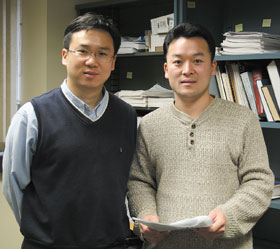  |
| HOME | THIS ISSUE | CALENDAR | GRANTS | BACK ISSUES | < BACK | NEXT > |
Chemical engineering professors developing artificial antibodies by Nan Cooper - February 4, 2008 | ||||
| Two faculty members in the Department of Chemical, Materials & Biomolecular Engineering, Yong Wang and Lei Zhu, are working to develop artificial antibodies capable of locating and destroying tumors. The three-year project, which began in July, is funded with a $450,000 grant from the National Science Foundation. Antibodies, proteins produced in the white blood cells of humans and other vertebrates, move freely through blood and fluids, where they identify and attack “foreign objects” such as viruses, bacteria, and other so-called antigens. This ability to fight off potentially dangerous invaders lies at the heart of vaccines, which function by increasing the production of antibodies. Wang says natural antibodies sometimes don’t function as well as we may want them to, for various reasons. For example, many antibodies are simply too large to penetrate the target – such as a tumor – that they are programmed to attack. Other antibodies are ineffective due to poor immunogenicity – the ability to excite a strong response against perceived foreign objects – or the fragility of their cell structures. Wang and Zhu seek to improve upon the effectiveness of antibodies, first by gaining a better understanding of the characteristics and functions of natural antibodies, then by developing artificial versions that offer greater stability and functional properties. The researchers are pursuing two parallel pathways, with biomolecules the focus of one path and artificial polymers at the heart of the second. They say natural biomolecules and synthetic polymers may be paired to obtain a more lethal tumor-fighting weapon. Living things are made up entirely of various types of biomolecules. The type of biomolecule Wang and Zhu are using in their work is RNA – ribonucleic acid – a nucleic acid that plays various roles in living systems, such as transporting information between DNA and the various protein structures within a cell.
These RNA biomolecules are capable of recognizing an antigen with great accuracy, and it is this characteristic that Wang will seek to better understand and exploit. The second part of their work involves the use of synthetic polymers, which may be used to transport tumor-fighting medicine to the site of the undesirable object, according to Wang. Acting in a complementary fashion, he says, “the biomolecules will control the motion of the polymers to the target disease within the organism.” The two researchers aim to demonstrate that humans can produce superior-functioning antibodies. Zhu’s group will focus on polymer synthesis, while Wang’s group will focus on other aspects, such as looking for biomolecules that can target tumor antigens, conjugate them with synthetic polymers, and test their functionalities. Wang and Zhu hope their work will help scientists design future nanobiomaterials with superior functionality, and expand the use of synthetic antibodies in the biomedical arena for drug delivery, bioimaging, and tissue engineering. These could be used, for example, in the delivery of cancer-fighting drugs, or as nanoprobes capable of moving through tissue and blood to sense underlying health problems even before symptoms emerge. |
| ADVANCE HOME UCONN HOME |

